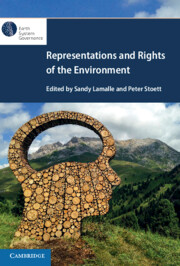Book contents
- Representations and Rights of the Environment
- Series page
- Representations and Rights of the Environment
- Copyright page
- Dedication
- Epigraph
- Contents
- Illustrations
- Tables
- Contributors
- Preface
- Acknowledgements
- 1 An Introduction
- Part I Challenges
- Part II Recollection
- Part III Perspectives
- 10 Rights of Nature, a New Perspective in Law
- 11 Property for Nature
- 12 Reimagining the Common Law
- 13 Democratic Representation, Environmental Justice and Future People
- 14 The Normative and Social Dimensions of the Transition towards a Responsible, Circular Bio-Based Economy
- 15 New Perspectives on Guardianship of Nature
- Index
- References
13 - Democratic Representation, Environmental Justice and Future People
from Part III - Perspectives
Published online by Cambridge University Press: 16 March 2023
- Representations and Rights of the Environment
- Series page
- Representations and Rights of the Environment
- Copyright page
- Dedication
- Epigraph
- Contents
- Illustrations
- Tables
- Contributors
- Preface
- Acknowledgements
- 1 An Introduction
- Part I Challenges
- Part II Recollection
- Part III Perspectives
- 10 Rights of Nature, a New Perspective in Law
- 11 Property for Nature
- 12 Reimagining the Common Law
- 13 Democratic Representation, Environmental Justice and Future People
- 14 The Normative and Social Dimensions of the Transition towards a Responsible, Circular Bio-Based Economy
- 15 New Perspectives on Guardianship of Nature
- Index
- References
Summary
In the context of current environmental crises, which threaten to seriously harm living conditions for future generations, liberal–capitalist democracies have been accused of inherent short-termism, that is, of favouring the currently living at the expense of mid- to long-term sustainability. This chapter reviews some of the reasons for this short-termism as well as proposals as to how best to represent future people in today’s democratic decision-making. It then presents some ideas of the author as to how to reconceive the idea of democracy and the responsibilities of citizenship in the face of increasing obligations to sustain both the environment and democratic institutions for future people. The chapter argues that taking turns between governing and governed is a key dimension of democracy, and that it implies in-principle consent to others governing after our turn, including future generations. Thus, future people must be better represented than they generally are today, in particular when democratic institutions find themselves squeezed between an overburdened environment in which they are embedded, and a fast-paced and short-termist globalising economy.
Keywords
- Type
- Chapter
- Information
- Representations and Rights of the Environment , pp. 310 - 333Publisher: Cambridge University PressPrint publication year: 2023

